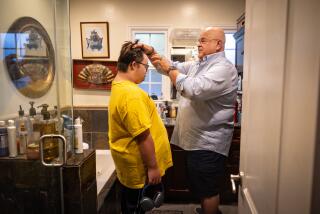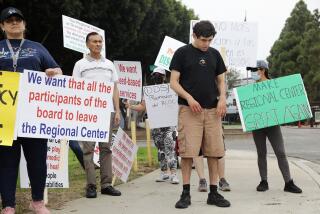Center for Deaf Faces Funding Cut
NORTHRIDGE — Cal State Northridge’s renowned National Center on Deafness could lose as much as half of its $2-million annual budget because of imminent changes in federal grant guidelines, campus officials said Tuesday.
But they also vowed to seek other sources of funding to preserve what one official called “a jewel” of a program at CSUN, which has the nation’s third-largest university population of deaf and hearing-impaired students.
Otherwise, the funding cuts, which would take effect July 1 when the campus’ current grant runs out, could reduce the tutoring, note-taking, sign-language interpreting and other crucial services the center provides the university’s 220 hearing-impaired students.
The center could still qualify for federal funds for the consulting services it provides to other colleges and universities throughout the Southwest as one of four such institutions in the country. CSUN officials said Tuesday they would reapply for those funds, while diligently pursuing other financing for help the center provides the campus’ own students.
“We want to do everything in our power to maintain the level of service. How we will get to that has yet to be determined,” CSUN Vice President of Student Affairs Ron Kopita said.
Kopita, who will co-chair a special panel named by CSUN President Blenda Wilson on Tuesday to research alternative funding, added:
“The center is a jewel. We want to maintain its luster.”
CSUN was one of the first mainstream universities in the nation to admit deaf and hearing-impaired students in the mid-1960s. Its National Center on Deafness, founded in 1972, today employs about 120 interpreters who accompany deaf students to class and translate what is being said to sign language. For students who are also unable to speak, they translate the students’ sign language for their instructors and classmates.
The center’s annual $1-million grant, which it has received unchallenged the past seven years, is one of the largest individual federal awards the campus receives and a major part of CSUN’s total $8 million to $9 million in annual federal support. Because of its significance, Wilson asked that the newly appointed committee deliver its report by May, before the funding expires.
At a minimum, campus officials expect to lose the $600,000 portion of the grant that has helped pay for the center’s direct, on-campus services to deaf students. Under the 1990 Americans with Disabilities Act, which requires public and private institutions to accommodate people with disabilities, the federal government no longer considers itself obligated to pay for CSUN those services, officials said.
Herb Larson, director of CSUN’s National Center on Deafness, said the three other federally designated deafness education centers--at the University of Tennessee, Seattle Community College and the St. Paul Technical College--all face similar grant changes.
He added that the expected funding changes are not a punitive measure against CSUN, despite some criticism of the center’s services in recent years. The changes also did not appear to be tied to broader budget cuts aimed at the U.S. Department of Education, Larson said.
The balance of the center’s annual federal grant--about $400,000 for consulting services--will still be available under the new guidelines. But CSUN will have to reapply for the funds and compete against other institutions. Larson and other campus officials said they planned to do so.
Although CSUN has yet to receive formal notice of the grant changes, Larson said they are “very definite” based on discussions with federal officials. He added that students probably don’t need to worry about cutbacks, but he cautioned that his operation cannot make do with less.
“I think the university is committed to finding the money. I think the university realizes this and that it is their responsibility,” Larson said. “But the money we’ve been receiving all along is just barely enough to provide equal services to students.”
More to Read
Sign up for Essential California
The most important California stories and recommendations in your inbox every morning.
You may occasionally receive promotional content from the Los Angeles Times.









